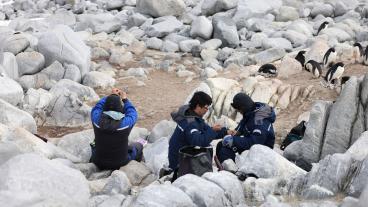The Commission’s decision-making is informed by scientific advice provided by the Scientific Committee and its working groups. Members undertake research, often collaboratively, on many issues such as the Antarctic ecosystem and physical environment, the ecology of key organisms and the impact of fisheries on target species and the ecosystem. CCAMLR also specifies data required from fishing vessels and by scientific observers onboard vessels. Much of the CAMLR Convention Area is in the high seas and therefore data are combined from multiple Members for analyses with results reviewed at meetings of working groups and the Scientific Committee.
CCAMLR has established several long-term fishery and environmental monitoring programs managed by the Secretariat, including the CCAMLR:
- Scheme for International Scientific Observation (SISO)
- Toothfish Tagging Program
- Ecosystem Monitoring Program (CEMP)
- MPA Information Repository (CMIR)
- Marine Debris Monitoring Program
- Vulnerable Marine Ecosystem (VME) Registry
The Scientific Committee provides advice to the Commission which develops conservation measures to manage fisheries using tools such as catch limits, spatial and temporal management actions, designation of marine protected areas, fishing activity constraints and data collection requirements. The Scientific Committee also invests in science capacity of Members by funding students through a Scientific Scholarship Scheme and other targeted science funds to assist Members in providing the information needed develop its advice.
